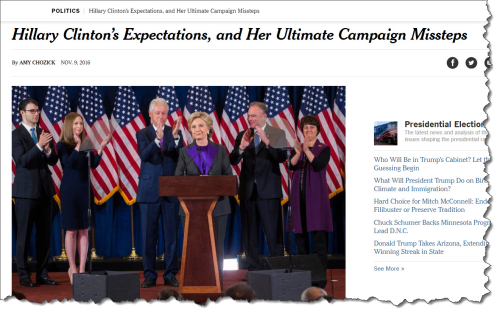Hillary Reportedly Ignored Husband Bill���s Suggestion to Pursue Working-Class Whites
A great piece by Amy Chozik over at the The New York Times highlights the key mistakes made in strategy by Hillary Clinton that ultimately went a long way to costing her the 2016 election.
The article, entitled, ���Hillary Clinton���s Expectations, and Her Ultimate Campaign Missteps,��� points out that while supporters of Mrs. Clinton were only too eager to cast blame for her loss far outside of her campaign - the Comey email re-investigation, for example, is a popular target of theirs - the reality is that much of the blame for her loss can be placed at the feet of Mrs. Clinton���s unwillingness to engage working-class whites in any serious way.
According to Chozik, reaching out to this demographic struck Hillary���s husband Bill as a particularly good idea, but he was unable to help his wife, or her sycophantic campaign stooges, see the light in that regard. When Bill Clinton attempted to convince the campaign that his wife should be doing more to connect with blue-collar whites, he was dismissed, and told that the best move for her to make was to stick with pursuing college-educated suburbanites.
Chozik says that Bill Clinton ���pleaded��� with campaign manager Robby Mook to more vigorously pursue both working-class whites and rural voters. Mook, however, discarded that idea, saying that they were better off solidifying their existing connections to voters of color and younger voters, more generally.
Bill Clinton, hailed as a master campaigner, likely saw the handwriting on the wall; working-class whites are just too large of a demographic to ignore, while Hillary���s support from groups of color, although real, was always going to be more restrained than it was for Barack Obama.
All of this makes sense. For all of her years on the national stage, I never once felt as though Hillary was talking to me. Rather, it always seemed that, as a demographic, I was completely invisible to her.
That���s certainly her decision, and my feelings are not hurt because of it���but if you are trying to win an election for President of the United States, should any meaningfully-sized group be one that you simply right off from the outset?
Two-term president���and husband��� Bill Clinton doesn���t appear to think so.
By Robert G. Yetman, Jr. Editor At Large




